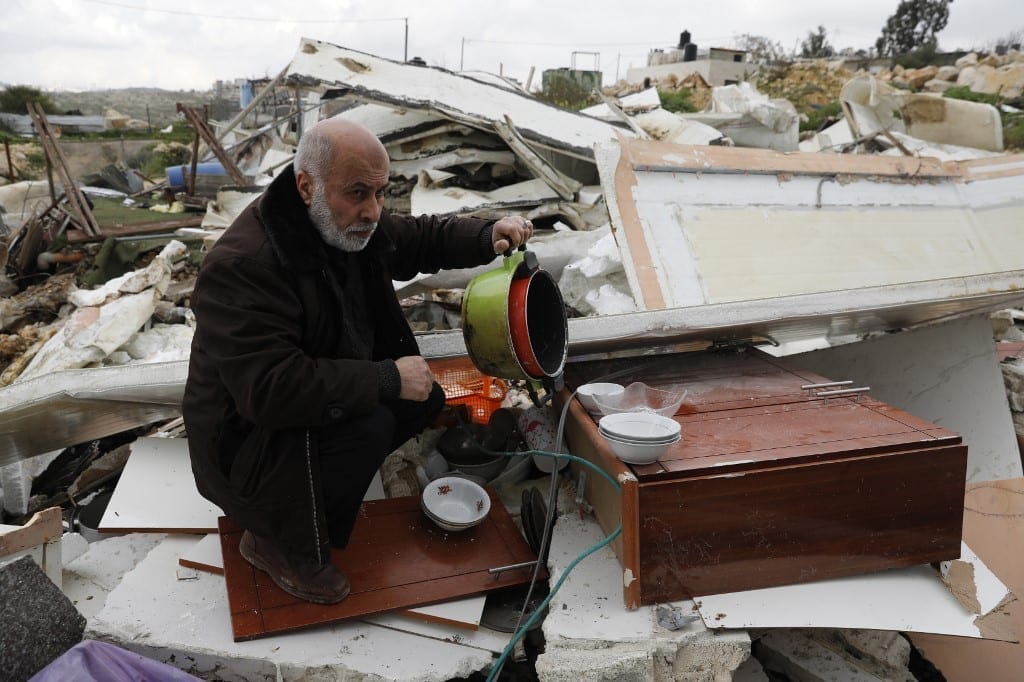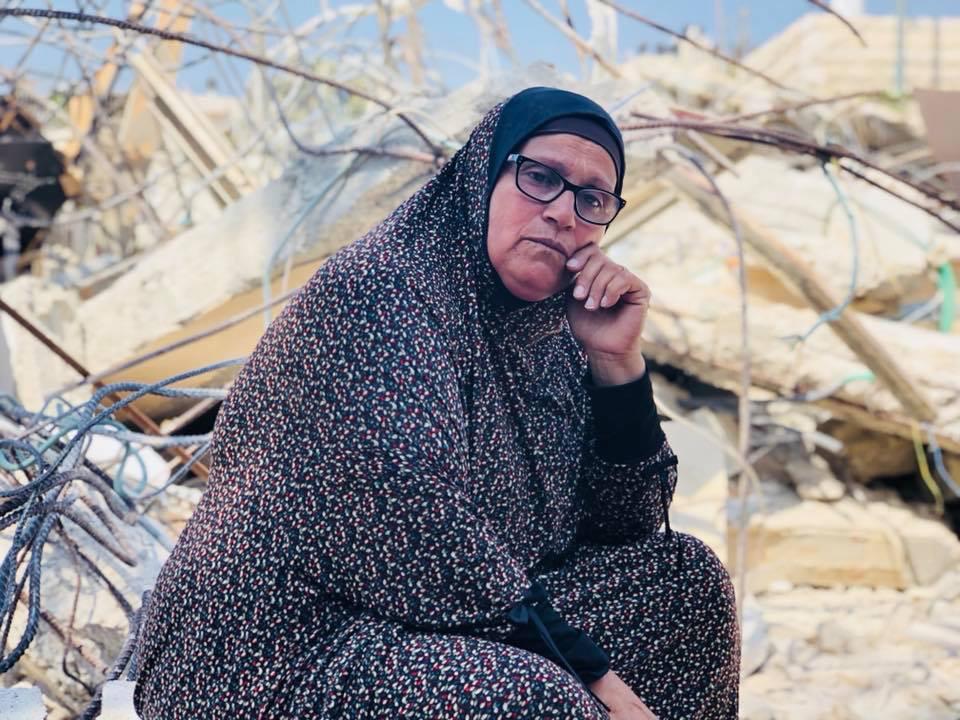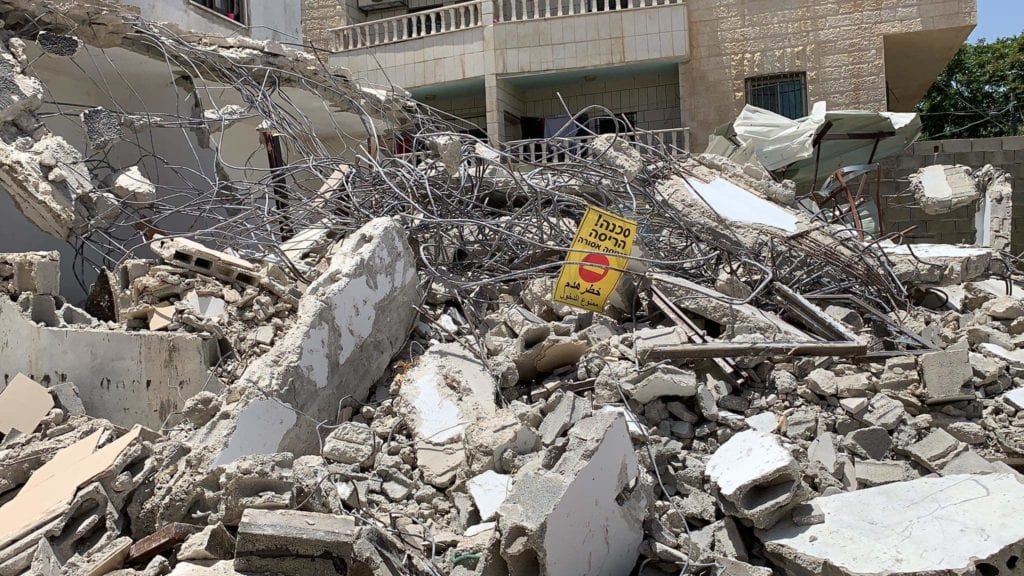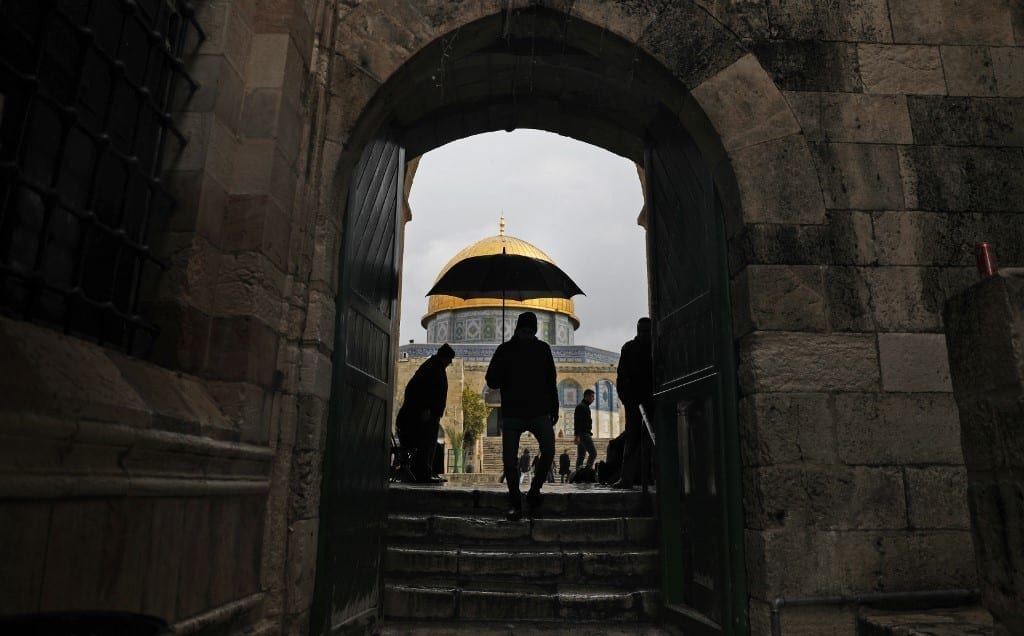With a heavy heart and oppressed hands, Saleh Al-Shobaki, the Maqdesian (Jerusalemite) citizen, started to knock down his house’s walls using simple hand tools. He was demolishing his own house according to the decision of the Israeli occupation municipality, to avoid the costs of the demolition if it had been carried out by the Israeli bulldozers under the pretext of not possessing the licenses, which are granted to the Maqdisians with great difficulty. These conditions are threatening the Palestinian presence in Al-Quds.
Al-Shobaki found himself facing a difficult choice. The first option was having his house in the Silwan neighborhood, south of Al-Aqsa Mosque, demolished by the Israeli machines, and paying a fine of 90,000 shekels, equivalent to around 25,000 dollars. The second option was to demolish his house with his own hands so he can avoid paying that amount, which he cannot afford. Al-Shobaki chose the lesser of the two evils and demolished his own house.
Although he demolished his only two-story shelter with his own hands because he couldn’t obtain a building license from the Israeli municipality, he insists on staying in his home city “Al-Quds”. So, he set up a fabric tent over the rubble of what his house used to be, to live inside it with his family of eight, after they became displaced.

A Difficult Emotion
Al-Shobaki, with tears in his eyes and his breath held, told Daraj: “Nothing is harder to endure than the feeling you get while demolishing your own home, the one you painstakingly built over the years with your own hands, to demolish it yourself in only a few minutes, but my hands are tied. If I hadn’t demolished it by myself, the Israeli machines would have demolished it and the occupation would imprison us and force us to pay the very high costs of the demolition.”
“The occupation forced me to destroy my own home, but it will not be able to destroy my determination, or to end my love and my attachment to Al-Quds. We won’t leave our city and we will continue living inside a tent on the rubble of our home which represents all we had throughout our lives.”
In a few minutes, the house that embraced Al-Shobaki and his family became nothing but piles of stones.
Had It Demolished Three Times…


Thousands of Maqdisian families are experiencing the same bitterness of the Al-Shobaki family experience. Those families are afraid they will have to demolish the homes that house their family members and businesses at any moment now. The Israeli (Ir Amim) organization, which is active in monitoring the Israeli violations in the West Bank and Al-Quds, revealed that Al-Quds municipality has forced 35 Palestinians to self-demolish their houses in Al-Quds during the first half of 2020.
For the third time in a row, the Maqdesian citizen Sanaa Farrah (Umm Thaer) had to demolish her home in the town of Beit Hanina, north of Al-Quds, with the help of her children and the townspeople. She could not afford paying the huge sums in exchange of having it demolished by the Israeli bulldozers.
Umm Thaer, 62 years old, stood on the rubble of her home shedding tears of oppression and grief, as she now faced homelessness and displacement with her sick husband and her five children. Since her family had already spent all their savings to build the home they demolished, they can’t afford to build a new one.
According to the Israeli human rights organization “B’Tselem”, during 2019 in East Al-Quds, Israel demolished 169 homes, which is more than the total of what Israel had demolished each year since 2004. The demolition displaced 328 Palestinians, including 182 minors. 42 of these houses were demolished by their owners in order to avoid paying the costs of demolition, which amounts to tens of thousands of shekels, if the municipality sends its machinery to carry out the demolition.
Unauthorized construction in the east of the city is only a direct result of the Israeli policy that prevents the Palestinians from any possibility of building according to the law, so they have no other choice. This restriction is one of the means by which Israel is trying to achieve Jewish demographic superiority in the city by reducing the livelihood of its Palestinian residents and forcing them to leave their homes as if this happened of their own free will.
From the beginning of 2004 to the end of 2019, the Al-Quds municipality demolished 978 homes in the east of the city, displacing 3,177 people, including 1,704 minors.


Dirty Politics
“Since the construction of the house in 2005, the occupation had followed a dirty policy. When we applied for a building permit, they asked for half a million shekels, and this is a huge amount that we cannot afford, and thus, we were only left with the choice of building the house. After devoting our lives to work on building the house and the freezing of our funds, the occupation’s municipality issued a demolition order against the house under the pretext of not obtaining a license!” Um Thaer explains sorrowfully to Daraj.
“There is nothing filthier than these practices. The municipality makes it impossible for the Maqdisians (Jerusalemites) to obtain licenses, and whenever we carry on constructing and building, it leaves us caught between two fires; either watching these buildings get destroyed by the municipality’s machines, which will cost us about half a million shekels, or demolishing them ourselves, which will cost us the pain, tears and sorrow that will remain for as long as the occupation stays in our land and denies us our rights,” Um Thaer added.
“We had to demolish the house ourselves three times, the first time occurred in 2011, leading us to spend more than two years renting houses. The second was in 2018, when we were notified again of its demolition order after its reconstruction. And the third time is now when we are given two days to evacuate and demolish the house ourselves, on the pretext that we did not obtain a building permit, or else we will pay a heavy fine.” She added.
Farrah explained that destroying her house, herself, felt like losing an organ, because she faced many challenges with her children to reconstruct their house.
Despite the demolition of the house, she insisted to not to leave it behind, and to live on its ruins, in an attempt to send the Israelis a message that they will not bring her to her knees and that they cannot carry out their flimsy plans in Jerusalem.


Fakhri Abu Diab, an expert in Jerusalem affairs, tells ‘Daraj’, “The Israeli occupation keeps on practicing all forms of racism against Maqdisians (Jerusalemites), thus, obtaining a permit to build a house in Jerusalem is not that easy, and there are many restrictions on granting it; such as imposing astronomical sums so that the Maqdisians (Jerusalemites) fail to obtain them, in order to humiliate them and to force them to leave their city.”
“Self-demolition is twofold suffering; the pain of losing the house and the pain of demolishing it yourself, especially as most people often invest their savings to build a house for them and their family members to live in. That’s why when the demolition begins, in front of the wife and kids, the world becomes foggy and dark.”
Breaking Morale and Pushing Arabs Away
Abu Diab confirms that Israel is seeking to break the Maqdisians’ (Jerusalemites’) morale, through these self-demolitions, and explains that evacuating the city from its Arab inhabitants, and providing empty geographic areas, allowing for settlement expansion in Jerusalem and its surroundings, are the reasons behind the intensifying pace of destroying the Palestinians’ homes, in Jerusalem city.
One of the most heavily attacked regions in Jerusalem, according to Abu Diab, is Silwan, in terms of evacuating it and expelling its inhabitants, in order to replace them with settlers, in addition to establishing Jewish projects, as Silwan is the closest, and adjacent to the south of Al-Aqsa Mosque. These policies escalated with Donald Trump’s rise to power in the United States.
A Professor of International Law at Al-Quds University, Dr. Munir Nusseibeh, describes self-demolitions as collective punishment against Jerusalem’s residents, a way of holding them accountable for holding a Jerusalem identification, and an attempt to change the city’s demography.
He indicates that “Israel” never adhered to the Fourth Geneva Convention, which its signatories, along with the human rights, legal and humanitarian bodies, asserted its effectiveness in the Palestinian territories.
He tells ‘Daraj’, “The signatories of the Fourth Geneva Convention prohibit the demolition of houses in their countries and consider it a crime against humanity, except for Israel, which overreaches the international laws, and issues demolition orders to hundreds of homes and facilities under the pretext of obtaining building permits.”
“The residents of Jerusalem suffer from the high cost of housing; as a house that does not exceed 100 square meters in floor area, costs approximately half a million dollars, due to the high price of land, construction costs, various taxes, and license fees imposed by the occupation’s municipality”, he added.
He indicated that Israel has racist attitudes towards the Palestinians, i.e. if a Palestinian attacks an Israeli settler, he receives harsh punishment. While settlers who attack Palestinians, on a daily basis, are never punished, and their actions are often justified as an act of self-defense.






